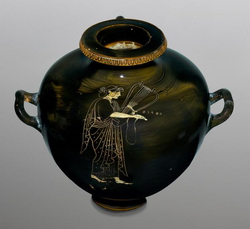Sappho (c. 620 - 570 BCE) was an Ancient Greek teacher[2] and lyrical poet.[1]
Life
Sappho was born on the Greek island of Lesbos sometime around 620 BCE.[1] It is well-attributed that she came from an aristocratic family,[1][3][4] and records suggest that she was the only daughter of four children of Skamandronymous and Cleïs.[5][6][7] According to Ovid's Heriodes, her father died when she was seven.[7] She is thought to have had one child of her own, named Cleïs after her mother - as was traditional - though some historians speculate, based on Sappho's own poems, that this person may have been a younger lover.[6]

Sappho was incredibly popular at the time and was honored in coinage and pottery long after her death.[1][4] However, very little of her work has survived, for a myriad of reasons; notably that she wrote in Aeolic Greek,[1] a dialect that Latin translators of the time could not read,[4] and though she was quite prolific, her work has simply been lost over the centuries. New discoveries have been made as recently as 2013, and one contemporary discovery in 2004 completed a fragmented poem for the first time in decades.[8]
Sexuality
While the terms lesbian and sapphic are both attributed to Sappho and her poems, controversy remains as to her own sexuality.[9] Both hetero- and homosexual (in the contemporary definition) legends of Sappho exist; for example, one story has her married to Kerkylas, a wealthy man from Andros,[4][note 1] while a second story ends with her suicide into the sea due to her unrequited love to Phaon, a sailor.[4] Historically, translators have heterosexualized Sappho's poems, and masculinized the objects of her affection; however, contemporary historians generally accept that her poems portray homoerotic feelings.[9]
Notes
References
- ↑ 1.0 1.1 1.2 1.3 1.4 1.5 1.6 "Sappho of Lesbos" by Joshua J. Mark on World History Encyclopedia. Published 2021-06-10. (Archived on 2024-03-28)
- ↑ "About Sappho" on Poets.org. (Archived on 2024-03-29)
- ↑ "Damn, Girl - Sappho, and her Immortal Daughters" by Irene Carstairs on That History Nerd. Published 2019-06-20. (Archived on 2023-10-02)
- ↑ 4.0 4.1 4.2 4.3 4.4 "Sappho" on Encyclopaedia Britannica. (Archived on 2023-10-02)
- ↑ "Sappho" on Poetry Foundation. (Archived on 2023-10-02)
- ↑ 6.0 6.1 6.2 "Sappho" by queerstorian on World Queerstory. Published 2019-04-07. (no backup information provided)
- ↑ 7.0 7.1 "Sappho Biography - Facts, Childhood, Family Life & Achievements" on The Famous People. (Archived on 2023-12-11)
- ↑ "Guide to the classics: Sappho, a poet in fragments" by Margureite Johnson on The Conversation. Published February 12, 2018-02-12. (Archived on 2024-03-29)
- ↑ 9.0 9.1 9.2 "How Gay Was Sappho?" by Mendelsohn, Daniel on The New Yorker. Published 2014-03-09. (Archived on 2024-03-27)
